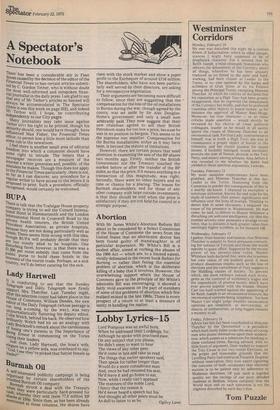A Spectator's Notebook
There has been a considerable stir in Fleet Street caused by the decision of the editor of the Financial Times to ban certain articles submitted by C. Gordon Tether, who is without doubt
e most well-informed and outspoken financial journalist in the daily press. lam glad to say that any of Mr Tether's articles so banned will always be accommodated in The Spectator (there is one this week on page 202), and indeed Mr Tether will, I hope, be contributing independently to our City pages. Many journalists may take issue against Tether over his right to be printed, though his seniority should, one would have thought, have 'influenced Max Fisher, the Financial Times editor, to permit him a little more latitude than some cub in the newsroom. I feel there is another small area of editorial freedom into which a columnist should have. some right to intrude. The letters that a newspaper receives are a measure of the interest a writer generates and, possibly, of the mistakes he makes. Though this does not apply to the Financial Times particularly, there is not, so far as I can discover, any procedure for a i regular writer to have access to the letters it s proposed to print. Such a procedure, officially recognised, would certainly be welcomed.
BUPA
There is talk that the Trafalgar House property company is trying to sell the Cunard International Hotel in Hammersmith and the London International Hotel in Cromwell Road to the Private health insurers, the British United Provident Association, as private hospitals, because they are not doing particularly well as hotels. There seems little wrong with this idea, though BUPA will probably decide that they are too noisily sited to be hospitals. One disturbing facet, however, is that there was a £1,500 per room subsidy that came from the ruulic purse to build these hotels in the interests of the tourist trade. Perhaps, as a sick country, we'll do better catering for the sick.
Lady Hartwell
it is comforting to see that the Sunday Telegraph and Dciily Telegraph now firmly support Mrs Thatcher. Last Tuesday night, House the selection count had taken place in the '911se of Commons, William Deedes, the new editor of the D i aily Telegraph (whose peerage s too. long a-coming, by the way), was very unJOurnalistically flattering his deputy editor, `31111 Welch, behind his back. He observed how brilliantly Welch had hit on an analogy with of Bracknell's remark about the carelessness losing one's parents in The Importance of eirig Ernest in commenting on the Tories °sing their leaders.
l Just then, Lady Hartwell, the boss's wife, ,e,,egant bn a yellow sofa, was overheard to say: "°d, I see Leader!" they've picked that fascist female as
1311rinah Oil
A
°rgahlsed by certain shareholders of the self:interested publicity campaign is being roubled B turmah Oil company.
7 struck a deal with the Treasury Y
en ," the were particularly hard-pressed for Whereby they sold them 77.8 million BP are.s at 230p. Since then, as has been already rnehtIoned in these columns, the shares have risen with the stock market and show a paper profit to the Exchequer of around E116 million. The shareholders, who have not been particularly well served by their directors, are asking for a retrospective negotiation. Their arguments are becoming more difficult to follow, since they are suggesting that the compensation for the loss of the oil installations in Burma during the war, though agreed by the courts, was set aside by Sir Alec DouglasHome's government and only a small sum arbitrarily paid. They now suggest that their new chairman agreed to sell their British Petroleum stake for too low a price, because he was in no position to bargain. This seems to be the supreme non sequitur. Compensation for the Burma installations, unfair as it may have been, is beyond the statute of limitations. However, there are certain points that need attention in examining the sale of the BP shares two months ago. Firstly, neither the British Government nor the Treasury touched the market before or after the transfer of the BP stake, so that the price, if it means anything in a transaction of this magnitude, was right. Secondly, there were no other buyers and no time or chance for a placing. The lesson for Burmah shareholders, and for those of any other company with large outside investments, is that they should be sold when the price is satisfactory if they are not held for control or a strategic purpose.
Abortion
With Mr James White's Abortion Reform Bill about to be considered by a Select Committee of the House of Commons the news from the United States that an abortionist doctor has been found guilty of manslaughter is of particular importance. Mr White's Bill is a modest affair, aimed at curbing the abuses of the 1968 Act — which are, to a limited extent, vividly delineated in the recent book Babies for Burning —rather than facing the essential problem of abortion, which is the deliberate killing of a baby that it involves. However, the overwhelming support which the House of Commons gave to the principle of Mr White's admirable Bill was encouraging: it showed a fairly vivid awareness on the part of members of some of the problems of abortion which few realised existed in the late 1960s. There is every prospect of a return to at least a measure of sanity in handling the matter.


































 Previous page
Previous page